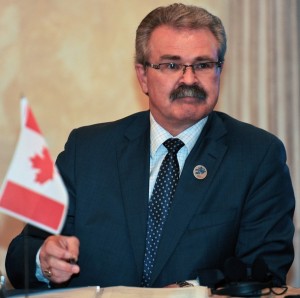After 23 people died linked to Maple Leaf cold-cuts in 2008, and 16 now sickened with E. coli O157 linked to the XL plant in Alberta, the person who is still, inexplicitly, the Canadian Minister of Agriculture, responsible for food safety activities, Gerry Ritz, has made his most revealing statement yet:
Government inspectors could have been “more hard-nosed.”
I’m not sure hard-nosed is a science- or evidence-based term that would be valued by a science-based organization like the Canadian Food  Inspection Agency, which reports to Ritz.
Inspection Agency, which reports to Ritz.
Sarah Schmidt reports that while speaking to parliamentarians Ritz said,“Looking back, what would we have done different? I think CFIA would have been a lot harder-nosed on getting the material from XL rather than being nice, and going the format with the letter and so on. You stand banging at the door until you got it. But we weren’t seeing any illness spikes to drive us to decertification. That wasn’t happening,” while characterizing license decertification as a “nuclear strike.”
Compare that with getting E. coli O157.
On Sept. 6, CFIA verbally requested distribution information and testing results for all products produced on Aug. 24 and Aug. 28, the days when the affected products were made. The agency followed up a day later with a written request to provide the documents by Sept. 8.
The documents were provided over a two-day period, Sept. 10 and Sept. 11, and Ritz testified Thursday the company “was not that forthcoming.” And when the records rolled in, there were “boxes of paper work that then had to be analyzed.”
Ritz added: “I don’t think they were intentionally trying to hide anything,” but rather “giving voluminous paperwork to cover off the bases.”
